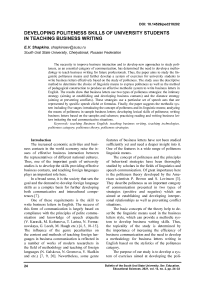Developing politeness skills of university students in teaching business writing
Автор: Shapkina E.V.
Рубрика: Непрерывное образование в течение жизни. Образование разных уровней
Статья в выпуске: 2 т.13, 2021 года.
Бесплатный доступ
The necessity to improve business interaction and to develop new approaches to study politeness, as an essential category of communication, has determined the need to develop a methodology to teach business writing for future professionals. Thus, the paper aims to study the linguistic politeness means and further develop a system of exercises for university students to write business letters effectively based on the study of politeness. The study uses the descriptive method to determine the choice of linguistic means to express politeness as well as the method of pedagogical construction to produce an effective methodic system to write business letters in English. The results show that business letters use two types of politeness strategies: the intimacy strategy (aiming at establishing and developing business contacts) and the distance strategy (aiming at preventing conflicts). These strategies use a particular set of speech acts that are represented by specific speech cliché or formulas. Finally, the paper suggests the methodic system including five stages: introducing the concept of politeness and its linguistic means; analyzing the means of politeness in sample business letters; developing lexical skills of politeness; writing business letters based on the samples and schemes; practicing reading and writing business letters imitating the real communicative situations.
Teaching business english, teaching business writing, teaching technologies, politeness category, politeness theory, politeness strategies
Короткий адрес: https://sciup.org/147234026
IDR: 147234026 | УДК: 811.111 | DOI: 10.14529/ped210202
Список литературы Developing politeness skills of university students in teaching business writing
- Arnold I.V. Stilistika. Sovremennyy an-gliyskiy yazyk [Stylistics. Modern English]. Moscow, Flinta: Nauka Publ., 2002. 384 p.
- Arutyunova N.D. Zhanry obshcheniya [Communication Genres]. Human Factor in Language. Communication, Modality, Deixis, M., 1992,pp.52-56.
- Brown P., Levinson S. Politeness: Some Universals in Language Use. The Discourse Reader. London and New York, 2004, pp.328-335.
- Formanovskaya N.I. Kul'tura obshcheniya i rechevoy etiket [Communication Culture and Speech Etiquette]. Moscow, IKAR Publ., 2004.236 p.
- Formanovskaya N.I. Russkiy rechevoy etiket: lingvisticheskiy i metodicheskiy aspekty [Russian Speech Etiquette: Linguistic and Methodological Aspects]. Moscow, 1987. 240 c.
- Galperin I.R. Tekst kak ob"yekt lingvisti-cheskogo issledovaniya [Text as an Object of Linguistic Research] Moscow, Nauka Publ., 1981.137 p.
- Galskova N.D. Sovremennaya metodika obucheniya inostrannym yazykam [Modern Methods of Teaching Foreign Languages]. Moscow, ARKTI Publ., 2003. 192 p.
- Graudina L.K. Kul'tura russkoy rechi [The Culture of Russian Speech]. Moscow, Izdatel'stvo NORMA Publ., 2002. 560 p.
- Gromova N.M. Delovoe obshchenie na inostrannom yazyke [Business Communication in a Foreign Language]. Moscow, Magister: INFRA-M Publ., 2010, pp. 183-237.
- Haugh M. The Constitution of Politeness Implicature in Conversation. Journal of Pragmatics, 2007, vol. 39, pp. 243-257. DOI: 10.1016/j.pragma.2006.07.004
- Karasik V.I. Yazyk sotsial'nogo statusa [The Language of Social Status]. Moscow, Institut yazykoznaniya AN SSSR Publ., 1991. 495 p.
- Koltunova M.V. Yazyk i delovoe obsh-chenie: normy, ritorika, etiket [Language and Business Communication: Norms, Rhetorics, Etiquette]. Moscow, Ekonomicheskaya Literatura Publ., 2002. 288 p.
- Larina T.V. [English Style of Phatic Communication]. Genres of Speech, 2005, iss. 4, pp. 251-262. (in Russ.)
- Larina T.V. [Politeness in Consciousness and Communication: Intercultural Aspect]. Mezhdunarodnyy sbornik nauchnykh trudov "Ak-tual'nye problemy kommunikatsii i kul'tury 2" [International Collection of Scientific Papers "Actual Problems of Communication and Culture 2"]. Pyatigorsk, 2005. 304 p. (in Russ.)
- Leech G. Principles of Pragmatics. London, New York, Longman Publ., 1983. 250 p.
- Maksimov V.I. Stilistika i literaturnoe redaktirovaniye [Stylistics and Literary Editing]. Moscow, Gardariki Publ., 2004. 561 p.
- Naterop B.J. Business Letters for All. Oxford University Press Publ., 2000. 103 p.
- Portal Federal'nykh gosudarstvennykh obrazovatel'nykh standartov vysshego obrazova-niya [Portal of Federal State Educational Standards of Higher Education]. Available at: http:// fgosvo.ru/ (accessed 25.09.2020).
- Shapkina E.V. [Features of the Translation of the Linguistic Category of Politeness in Business Correspondence]. Languages. Cultures. Transfer, 2015, no. 1, pp. 302-309. (in Russ.)
- Skalkin V.L. Osnovy obucheniya ust-noy inoyazychnoy rechi [Fundamentals of Teaching Oral Foreign Speech]. Moscow, Russkiy yazyk Publ, 1981. 182 p.
- Solganik G.Ya. Stilistika teksta [Stylistics of the Text]. Moscow, Flinta: Nauka Publ., 1997.252 p.
- Soloviev E.Ya. Sovremennyy etiket. De-lovoy i mezhdunarodnyy protocol [Modern Etiquette. Business and International Protocol]. Moscow, Os'-89 Publ., 2003. 320 p.
- Trofimova O.V., Kupchik E.V. Osnovy delovogo pis'ma [Basics of Business Letters]. Moscow, Flinta: Nauka, 2010. 303 p.
- Vinogradov V.V. Problemy russkoy sti-listiki [Problems of Russian Stylistics]. Moscow, Higher School Publ., 1981. 320 p.
- Znamenskaya T.A. Stilistika angliy-skogo yazyka [Stylistics of the English Language]. Moscow, Editorial URSS Publ., 2002. 208 p.


